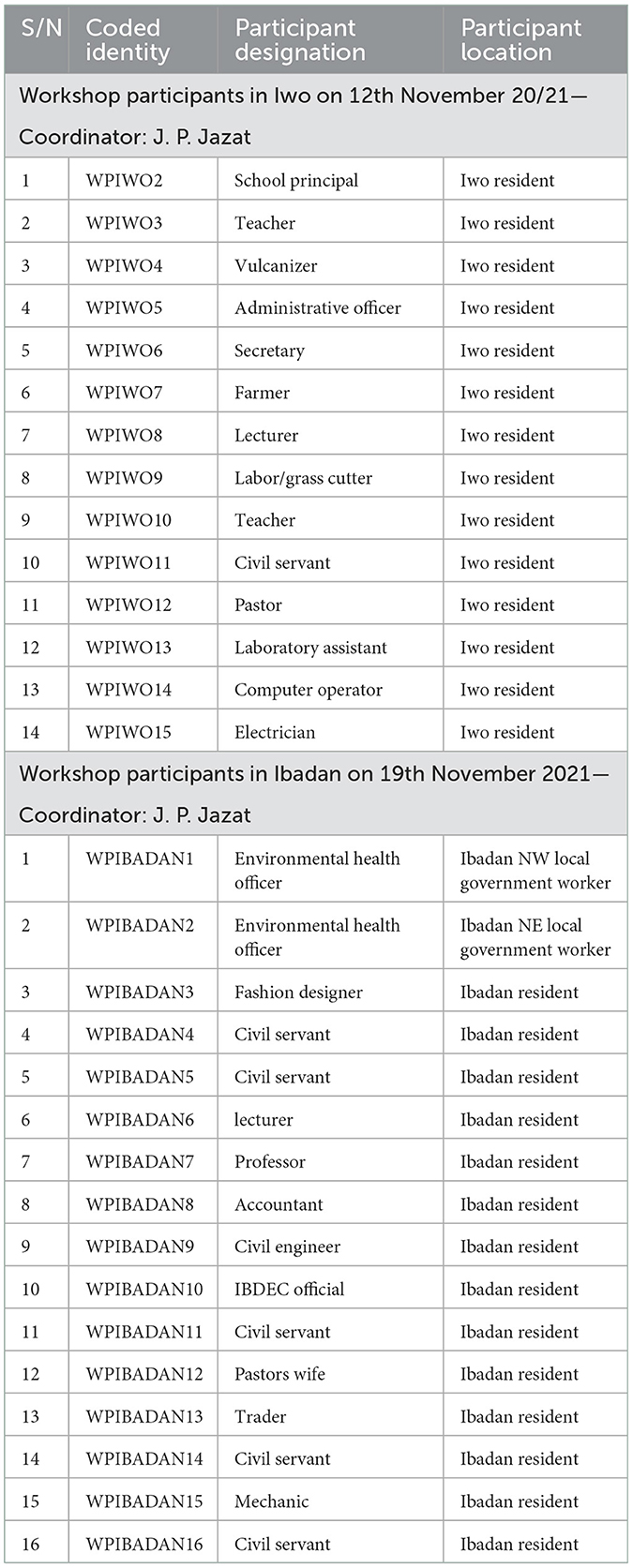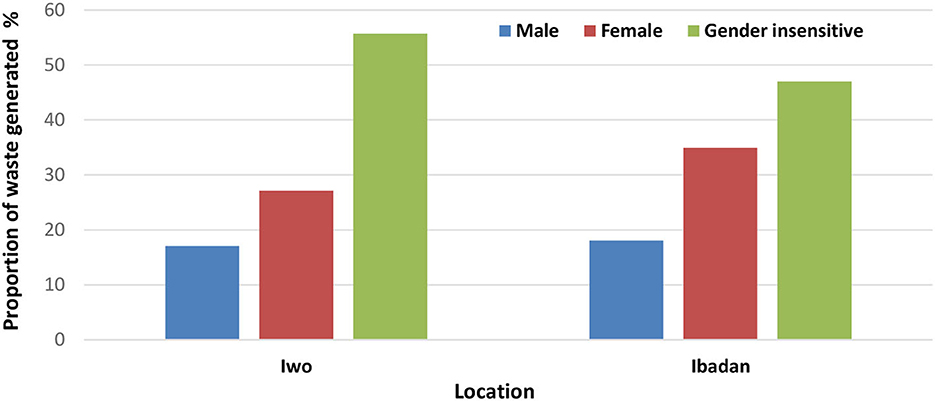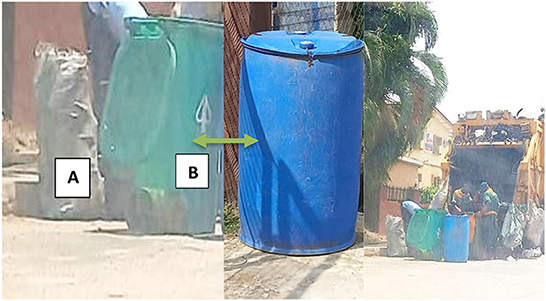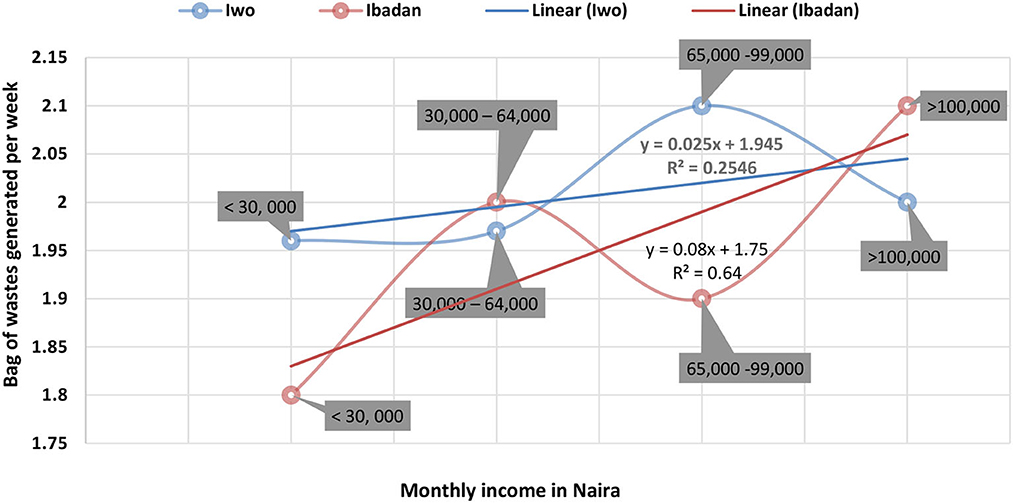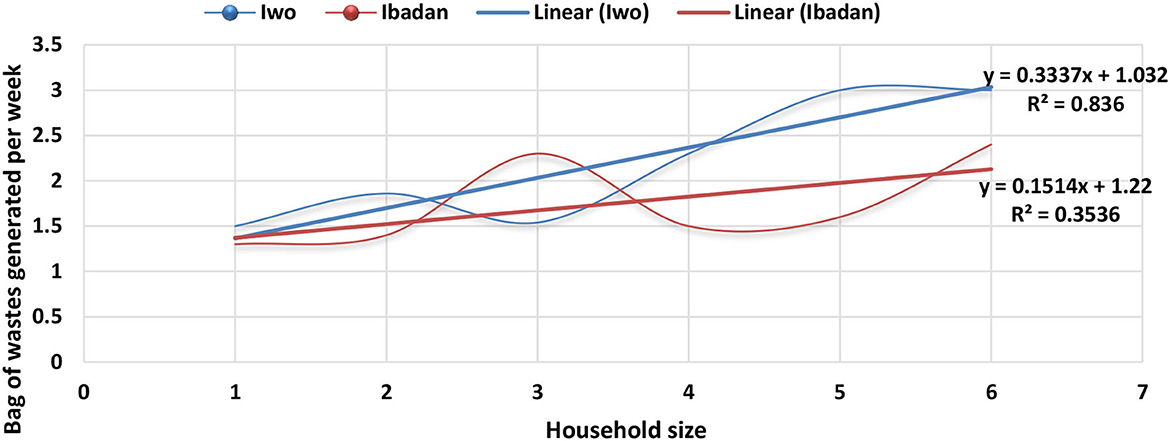- Environmental Management Unit, College of Agriculture, Engineering and Science, Bowen University, Iwo, Osun, Nigeria
Factors governing stakeholders' choice of gathering and disposing of solid wastes in some southwestern states of Nigeria were appraised using Iwo and Ibadan as case studies. The objectives were to determine associated challenges and recommend possible improvements. The study administered 1,400 structured questionnaires, out of which 873 (62.3%) were respondents. The data obtained were analyzed using descriptive and inferential statistics. The result showed an upward trend in solid waste disposal in the two communities, according to stakeholders' income and household size. Solid wastes generally encountered in the study areas include foods, leaves, papers, clothing, leather, hair attachments, nylons, plastics, metals, and cans which often litter the dump environment. The economic cost of a sack-load of waste was *N200 in Iwo and N495 in Ibadan, and the frequency of waste removal is 150% higher in Iwo than in Ibadan. The average distance to the dumpsite is 2 km, which discourages low-income earners who are mostly pedestrians. Ibadan residents are culturally disposed to dirty streets and drainages/gutters with solid wastes; unfortunately, the situation in Iwo is not different. Stakeholder perceptions of factors impacting waste disposal in Iwo gave greater weight to (1) income and spending power, (2) culture, (3) religion, (4) governmental intervention, and (5) health factors in that order. In Ibadan, (1) income and spending power, (2) health factors, (3) occupational hazards, and (4) religion were rated in that sequence. It is conjectured that these issues demand strong attention in efforts to build functional capacities for solid waste disposal.
Introduction
Solid waste management had been studied severally (Agamuthu, 2004; Asase et al., 2009; Banjo et al., 2009; Olukanni et al., 2014; Haidy et al., 2016; Salami et al., 2018 etc.), and recommendations are made for effectiveness and sustainability. Solid wastes cause diseases, stench, and the ugliness of landscapes. They also contaminate soil, water, and air and endanger the health of humans and other living organisms (Dehghani et al., 2021).
To avoid health problems associated with solid waste, depositing the wastes in landfills is a highly recognized traditional disposal method that buries the waste in the land. Incineration is another method of disposal that employs the combustion of solid wastes by burning them at elevated temperatures, converting them into ash residues and gaseous particulates. Incineration (Salami et al., 2018; Dehghani et al., 2021) is capable of reducing the volume of solid wastes by up to 30% of the original volume and decreasing the management process, the collection, transportation, and the disposal of the solid wastes. Albeit these technologies, communities in southwestern Nigeria are increasingly vulnerable to environmental degradation, and their empowerment to tackle identified challenges is crucial. To accomplish this task, solid waste disposal methods and preferences in two metropolitan cities, i.e., Iwo and Ibadan, Nigeria, were studied, and salient factors were identified to enable the improvement of livelihood and socio-economic needs that are critical for success. The goal was to evaluate the verifiable components and processes so that community life could be made better, healthier, and more sustainable.
Education helps improve knowledge about wastes (Yusuf and Fajri, 2022). Environmental education promotes responsible behavior that helps people acquire the knowledge, attitudes, values, commitments, and skills needed to solve problems. Beneficiaries also acquire a caring attitude, curiosity, and concern for the environment in the form of skills, attitudes, and behavior.
Population significantly influences waste generation and management, and this assertion was made by Omololu and Lawal (2008) for the Lagos metropolis. Also, cultural values are barriers to efforts geared toward waste management in Nigeria. Another hurdle is the lack of involvement of producers in waste management, and the solution lies in making municipal waste management people-centered. Abila and Kantola (2013) advised on ways to improve information on the benefits of waste management so that the producers' involvement in waste management and implementation of related government policies can be improved.
Evidence abounds to show that culture and religion are interwoven (Ajani, 2008; Ajani and Fakunle, 2021). Thus, seasonal flooding experienced at some respondents' locations may not be unconnected with cultural, attitudinal, and religious prejudices. A report of an assessment carried out by Aderemi and Onawole (2017) showed that women in Ibadan had poor knowledge of the health consequences of improper waste disposal. They were also found to have inadequate health education that should be consciously provided. Cultural differences could be overriding. For example, Asase et al. (2009) reported waste management in a place like London, Ontario, Canada, which is designed to handle and dispose of solid wastes appropriately, where the responsibility of all stakeholders is clearly defined and integrated; all major services touching on sanitation consciousness (Pacey, 1990) receive the support of both the private and public sectors. The situation was different in developing economies like Ghana, and the postulate was that if the integrated framework described for London is adopted, it could help developing countries like Nigeria to improve their waste management tactics.
Dajadian and Koch (2014), as well as Haidy et al. (2016), believed that solid waste disposal could be sustainably handled through effective policy formulation. Waste disposal methods were reported by Ogunmakinde et al. (2019) to include incineration, burning, land filling, recycling, reuse, open dumping, pyrolysis, shredding, etc. They considered that waste management plans should henceforth include pay-as-you-deposit/dump legislation.
Solid waste generation, collection, handling, and disposal are often limited by space and may constitute an environmental nuisance if the planning regimen is not strategic and sustainable. Solid waste management could be challenging where issues of poverty, population dynamics, and ignorance resulting from different levels of development and urbanization are decisive. It was already established that population growth influences solid waste generation, disposal, and management (Abd'razack et al., 2013), as well as people's standards of living (Omololu and Lawal, 2008). According to Adepoju and Salimonu (2009), 35% of Osun State residents dispose of their wastes by the roadside, at dumpsites, or in nearby bushes, indicating their rural outlook and poor economic standing. The authors reported that only 25% of Osun State residents utilize waste collectors, who even collect mere tokens from them to dispose of the refuse. Other factors, including socioeconomy, educational status, and exposure, were believed to affect the quantum, value, and nature of solid wastes generated. A cross-city survey reported by Onibokun and Kumuyi (2004) in various areas of Ibadan gave the mean solid waste generated as 0.42 kg/day in government reservation areas (GRA), 0.35 kg/day in the old city communities, and 0.38 kg/day in outlying areas, meaning that experience with solid waste disposal could be location-dependent. Bennett et al. (2018) defined environmental stewardship as actions taken by a network of actors with different motivations and capacities to protect, care for, or responsibly use their environment.
The current investigation explored the significance and interrelationship between the human capital index (a measure of economic power and wellbeing) and environmental stewardship, also an understanding of how the residents cope with associated challenges and react to contemporary waste generation and management issues.
Methodology
Study areas
The survey locations are Ibadan metropolitan city in Oyo State and the less developed city of Iwo in Osun State. These are neighboring states in the southwestern region of Nigeria. The two cities are close enough and cost-effective for relative data collection and assessment. Iwo is a local government headquarters of Osun State, and it is situated between latitudes 7°38′N and 7°40′N of the Equator and longitudes 4°09′ and 4°13′E of the Greenwich Meridian. The town is divided into five (5) quarters, namely, Isale Oba, Molete, Oke-Adan, Oke-Oba, and Gidigbo, and each quarter consists of several federal and state wards (Ogunbode and Ifabiyi, 2014). It covers an area of 245 km2, with a projected population of 263,500 by 2022 (Demographia, 2016). Ibadan metropolis, on the contrary, is located between longitudes 7°2′ and 7°40′E and latitudes 3°35′ and 4°10′N. The city covers an area of 4,200 km2. It is the capital of Oyo State, Nigeria, and consists of 11 LGAs, with six semi-urban local governments in the less city and five urban local governments in the city (Salami et al., 2017), out of which three, namely, Ibadan North, (IN), Ibadan Northwest (INW), and Ibadan Northeast (INE) were purposefully selected for their proximity to the hub where the researchers are based and for cost reasons. The surveyed area has an estimated population of 1,115,000 people (Demographia, 2016).
Preliminary findings and stakeholder involvement
Data were obtained from primary sources, including stakeholder workshops, questionnaire administration, and direct interviews. The study explored stakeholder perceptions and choices of solid waste disposal in residential households with participants from the study areas. A preliminary questionnaire was developed and administered to some residents responsible for generating, disposing, and collecting the solid wastes in the target areas, all randomly sampled. The questionnaire had space for demographic data (e.g., age/gender/telephone numbers, email address) that helped to contact and invite them later for workshop meetings after being briefed on the importance of the research work. Two meetings (Table 1) were held at hired locations close to the areas to be surveyed, one in Iwo and the other in Ibadan. PowerPoint presentations were made to explain the contents of the prequestionnaire, and stakeholders were encouraged to express and add their thoughts on the issues. Virtual communication by e-mail also helped in gathering information from a few of the respondents. Critical are the challenges they face in their solid waste management and their internal understanding and engagement with available technologies. The workshop was organized not to take more than 2 h and consensus opinions that provided real insight into any issue discussed were accepted as general. For example, 70% agreement or higher is considered a reasonable consensus. Subsequently, a final structured questionnaire was prepared to capture the new perceptions that added value to the original pre-questionnaire and the redundant elements were removed. We also desired to know how long it would take to complete the prepared new questionnaire, and a few trials indicated that 20 min on average was adequate.
Data collection and sampling intensity
The structured questionnaire was finally administered to target respondents, some of whom were interviewed directly while others promised to complete the questionnaire and return to the source. The questionnaire examined the solid wastes most common in the study areas. The variables assessed were demographic and economic factors perceived to influence such practices. The factors were age, location, gender, religion, culture, income, health status, and governmental interventions, which were ranked based on the stakeholder's perception. The value of age and gender and their correlation with waste generation; locational influences with regard to the distance to be covered to reach the dumpsite from their respective houses; access to municipal waste vehicles; and how long the respondents have been staying at that location are components of the questionnaire. The work goes further to evaluate the experience of seasonal flooding at the respondents' locations. Income level is considered a measure of the respondent's economic status, which may be positively correlated with or derived from educational background, literacy level, the type and structure of living apartments occupied, availability of a functional sewage system, frequency of waste removal, and ability to pay refuse collectors; use of alternative packing materials; and adoption of recycling and reuse strategies.
Response of stakeholders, across religious circles having differential family structure and household size, gender limitation, and societal pressure, was also assessed in addition to the ethical transformation that could be linked to respondents' experiences and exposure on how waste management should be better handled elsewhere. Furthermore, the questionnaire explored health-related matters to see how sanitation culture, frequency of waste removal, and sorting practices influence the occurrence and prevalence of certain types of diseases in the study areas. Demographic variables like population density and distribution at the study sites were considered to evaluate how these issues have impacted and directed government interventions in solid waste disposal. Data analysis was basically descriptive and inferential, making use of tabulation, means, percentages and frequency distribution, graphs, F-statistics, and regression analysis with the aid of the Microsoft Excel 2022 application for Windows.
Results and discussion
Response to the survey
The sampling intensity was 1,400, of which 873 (215 in Iwo and 658 in Ibadan) were respondents. This gave a 62.3% return of the total surveyed samples. The two main research questions are (1) the influence of economic power on solid waste management and (2) the coping strategies of residents to surmount the challenge. Table 2 summarizes the perception of respondents about economic factors affecting solid waste disposal in the two cities, while Table 2 provides the demographic status of Iwo and Ibadan and the respondents' ratings of demographic and sociological factors affecting solid waste disposal in the region.
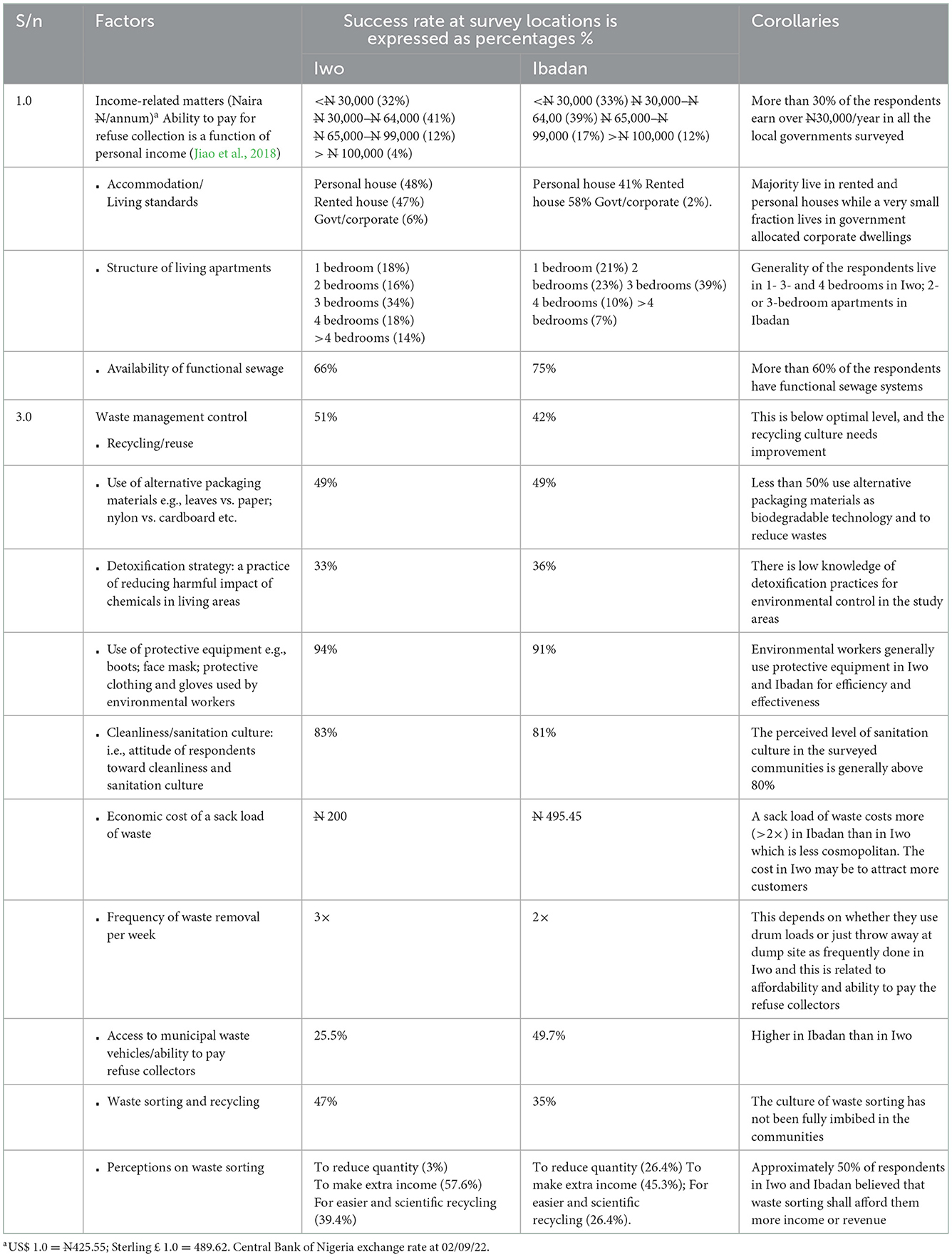
Table 2. Perception of respondents to economic factors influencing solid waste disposal in Iwo and Ibadan.
Economic power and environmental stewardship
Human capital indices evaluated in this study include accommodation and living standards, which are the measures of economic power. The value of the respondents' monthly income and their inclination toward solid waste removal were assessed. In total, 45.5% of the respondents in Iwo and 38.5% in Ibadan earn between N30,000 and N64,000, while another 4.5% of respondents in Iwo and 11.5% in Ibadan earn above N100,000 monthly. The finding was that respondents from Ibadan generally earn a higher income than those from Iwo (Table 2). A third of the respondents in all the local governments surveyed earn more than N30,000/year.
Environmental goals, like attempts to restore dirty habitats to normal, were found to be a primary motivator for engaging in stewardship, and this makes refuse collection and disposal costs a social responsibility. In other words, the ability to pay refuse collectors, access to municipal waste collectors and vehicles, clean technology to produce organic fertilizers from dump wastes, etc. may constitute significant variables of concern. The average cost of a sack-load of waste in Iwo was *N200, while in Ibadan, it was N495.45 (N200 = US$ 0.47; N495 = US$ 1.16). The frequency of waste removal is three times per week in Iwo and two times per week in Ibadan. It is assumed that those with higher income groups could afford to hire contractors that have refuse collection and transportation vehicles to dispose of their garbage, whereas the lower income group would rely on getting rid of their wastes manually. Incidentally, Figures 5, 6 show upward movement in the quantity of solid wastes generated with improved income and household size, although at different rates. The rate of increase in Ibadan (R2 = 0.64) is higher than that of Iwo (R2 = 0.26) as far as income is concerned, whereas with household size, Iwo (R2 = 0.84) is higher than Ibadan (R2 = 0.35). The reason behind differential increment and correlation power needs further exploration to pinpoint other contributing factors and their relative impacts.
Coping strategies
Factors identified to affect the coping strategies of respondents include demographic features such as age, gender, population size, literacy level, religion, and culture. Also important are government influence and involvement, respondent location, and health matters.
Age and gender statistics of respondents
In Iwo and Ibadan, the average age of respondents (Table 3) is 39 and 35 years, respectively. At p < 0.05, there was no clear or significant statistical difference in the ages of the respondents. The surveyed population consists mostly of married individuals (>60%) and singles (>30%), and their family structure, educational background, and literacy level are similar in Iwo and Ibadan.
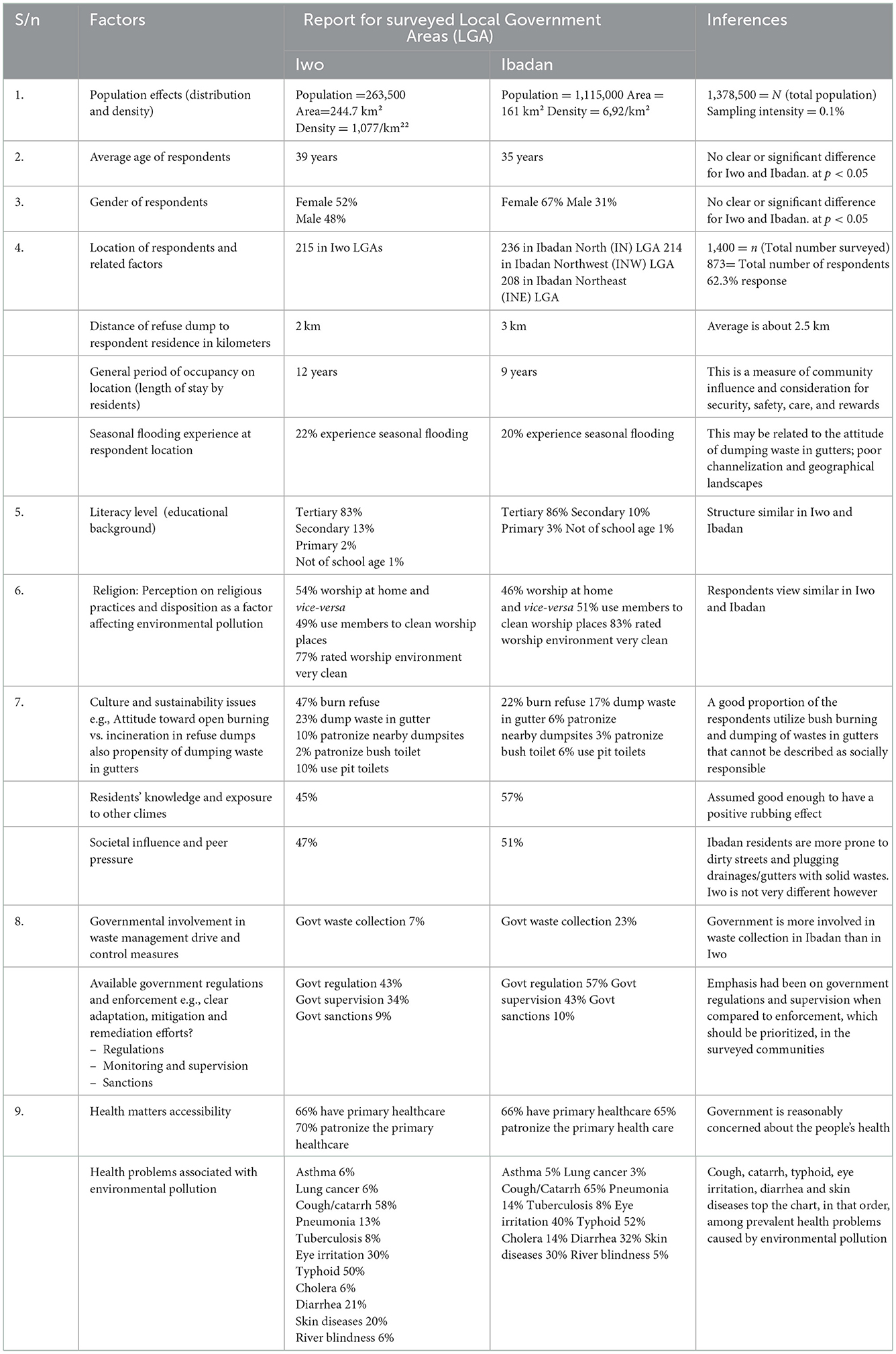
Table 3. Demographic status of Iwo and Ibadan and respondent ratings of sociological factors affecting solid waste disposal.
Figures 1, 2 show that solid waste generation is gender- and age-sensitive because females throw away more waste than males and children more waste than adults.
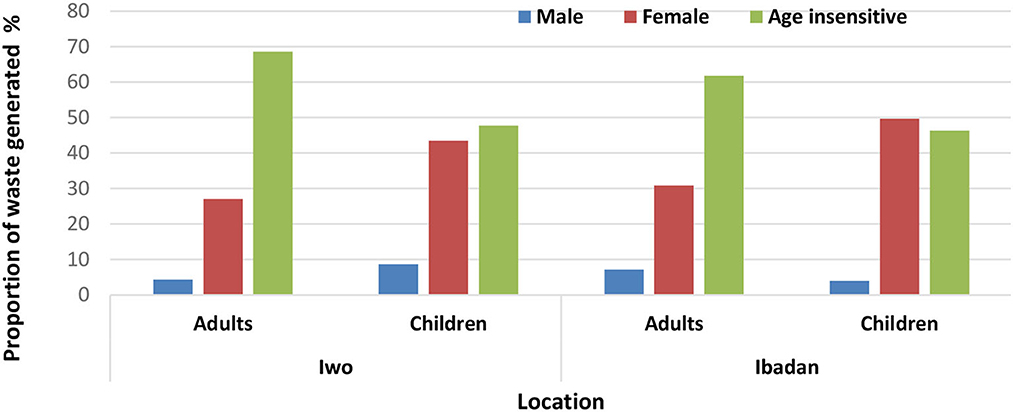
Figure 2. Adult and children involvement in waste generation respondents' location and related factors.
Many of the respondents in Iwo have stayed for about 12 years at their residence, and respectively, for 9 years at Ibadan (Table 3). We imagine that continuous residency is a measure of community influence and consideration for security, safety, care, and rewards. Forty-five percent of the respondents in Iwo have knowledge of and exposure to other climes, and the 57% recorded at Ibadan were assumed to be good enough to have a positive rubbing effect on their local knowledge and disposition toward effective solid waste management. However, due to various compositions of the wastes at different locations, the hazards of their constituents may also be different. Suffice to say, there is low awareness of detoxification practices for environmental control in the two study locations. The average distance to the dumpsite, which is about 2 km could be particularly limiting to low-income earners, who are mostly pedestrians and could not hire refuse vehicles.
Value of education and literacy
Table 3 also reveals that in Iwo and Ibadan, the culture of waste sorting has not been well imbibed. Their submissions showed that 3% of the respondents in Iwo felt sorting merely helped reduce the quantity of wastes; 57.6% believed that sorting helped make extra income, and 39.4% believed that sorting made recycling easier. In Ibadan, 26.4% rated sorting as useful for reducing the quantity of wastes; 45.3% rated it as useful for making extra income; and 26.4% rated it as useful for making scientific recycling easy. The general picture is that about 50% of respondents in Iwo and Ibadan believed that waste sorting would afford them more income or revenue.
Culture and sustainability
Ibadan residents are culturally predisposed to living through dirty streets and plugging available drainages and gutters with solid wastes. Unfortunately, the custom is gradually replicating itself in Iwo as the city gets more urbane (Table 3). In Iwo, 47% burn refuse, 23% dump their wastes in gutters, and 10% patronize nearby dumpsites. In Ibadan, 22% burn their refuse, 17% dump wastes in the gutter, and 6% use neighboring dumpsites. Iwo is a predominantly Muslim society compared to Ibadan, and responses from the two communities are comparable in that 77% of respondents rated the worship environment as very clean in Iwo while 83% rated the worship environment as similarly clean in Ibadan.
The rated level of sanitation culture in the surveyed communities is generally above 80%. The use of protective equipment such as face masks, boots, protective clothes, and gloves by environmental workers is typical. The survey showed that 94% of people in Iwo and 91% in Ibadan used protective equipment. This is encouraging, and the attitude of respondents toward cleanliness and sanitation culture is impressive. The cognitive response is 83% in Iwo and 81% in Ibadan (Table 3), and this corroborates the rated response to sanitation culture, which is above 80%.
Recycling and reuse culture is below the optimal level in Iwo (51%) and 42% in Ibadan, and this needs improvement. In both cities, < 50% of respondents use alternative packaging materials, namely, Leaves vs. Paper and Nylon vs. Cardboard, as biodegradable substitutes to reduce waste. Generally, access to municipal waste vehicles and the ability to pay refuse collectors are higher in Ibadan than in Iwo, which may allude to a differential income where the cumulative fraction of those earning more than N65,000/month (16% is lower in Iwo compared to 29% in Ibadan).
Governmental involvement
An assessment of government waste management drives and control measures was done, which showed that the government has so far been more involved (Table 3) in waste collection efforts and erosion control in Ibadan (23%) than in Iwo (7%). Approximately 20% of the respondents in Iwo and Ibadan reckon that seasonal flooding is a common phenomenon in their vicinities, and this may be related to the attitude of dumping waste in gutters, poor channelization, and geographical landscapes. Governmental efforts at river channelization are grossly hindered by attitudes and culture that have clogged the drainages.
Data from Iwo and Ibadan (Table 3) showed that government is reasonably concerned about the people's health. In Iwo, 66% of the community has primary healthcare, and 70% of the residents patronize the healthcare. In Ibadan, 66% has primary healthcare, and 65% patronize the healthcare.
Health matters
Health problems associated with environmental pollution in Iwo and Ibadan are featured in Figure 3. Cough and catarrh were the most common, followed by typhoid, eye irritation, diarrhea, skin diseases, pneumonia, cholera, river blindness, lung cancer, and asthma.
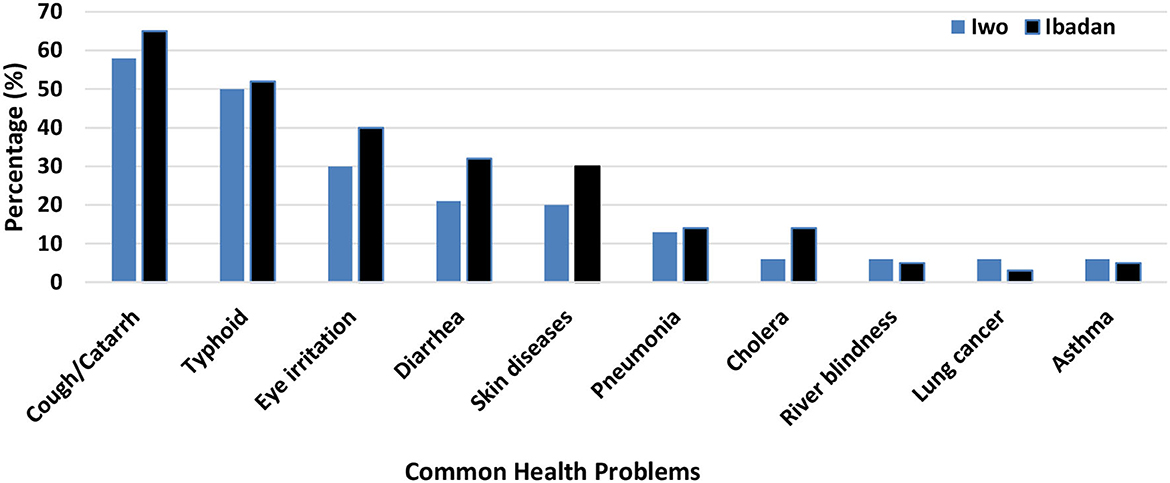
Figure 3. Respondents' rating of health problems associated with environmental pollution in Iwo and Ibadan.
Solid wastes common to the study areas
Solid wastes generally encountered in the study areas are left-over foods, peels of yam, oranges, cassava, leaves, papers, clothes, leather shoes, cosmetics and hair attachments, nylons, plastics, metals and cans, and sentries like pants, pampers, etc., which, when not effectively managed, often litter the dump environment.
Quality of life was also rated using the respondents' dwelling place or accommodations as a relative measure of living standards. The majority of the survey respondents live in rented and personal houses, with only a small percentage living in government-allocated corporate dwellings. In Iwo, 48% live in their personal houses/residences; 47% live in rented apartments, while only 6% live in residences provided by the government or corporate organizations. Relatively, in Ibadan, 41% live in their personal houses, 58% in rented houses, and 2% in government or corporate dwellings.
The frequency of waste removal, on an average is three times per week in Iwo and two times per week in Ibadan. Differences in the frequency of waste removal per week hinge on the human capital index or spending power, i.e., the capability of respondents and affordability to pay the refuse collectors and whether they used drum loads (Figure 4) or just throw away the refuse at dump sites as frequently done in the less cosmopolitan Iwo. The economic cost of a sack/load of waste in Iwo is less than that of Ibadan. In this study, uniform cost evaluation of solid waste disposal was done using the rice sack (Figure 4) as a standard load of refuse measurement. The cost in Ibadan is more than double that of Iwo, which is less cosmopolitan, and the reason may be to attract more patronage.
Reference to Figure 3 showed that health problems related to solid waste pollution are more prevalent in cosmopolitan Ibadan than in Iwo, and this suggests that individuals and groups with different socioeconomic status may accordingly experience differential health qualities. There are communities in the surveyed region that bear the effects of pollution disproportionately, resulting in higher rates of illness and death, developmental impairments in children, and other varieties of economic harm.
The assumption that high-income earners generate more wastes is however not tenable and has low correlation power (Figure 5). People in the low- and high-income categories generally produce a lot of waste in Ibadan and Iwo. The middle-income category produces less, on a relative basis. Behavioral patterns of people earning over N64,000 monthly, relative to the quantity of waste generated and disposed in Ibadan when compared to Iwo, could be an adjustment process to complicated and localized economic realities. A linear correlation of solid waste disposal with household size was also established (Figure 6) for the Iwo and Ibadan metropolis, and an upward trend in disposal volume is to be expected as household size increases.
Stakeholder perception of the various factors that were found to influence waste disposal and coping strategies in Iwo was emphasized as follows: (1) income and spending power are evaluated through household size and structure, (2) cultural adaptation, (3) religious influences, (4) governmental intervention, and (5) health-related issues. In Ibadan, (1) income and spending power of respondents, (2) health-related issues, (3) occupational-related hazards, and (4) religious influences that were rated paramount in sequence.
Enabling capacities for proper environmental management can therefore be said to include (1) social capital that facilitates incentives that support stewardship; (2) cultural capital that describes the propensity to place and inclination to maintain traditions, practices, and artifacts that are central to an identity that supports stewardship; (3) financial capital that refers to financial resources and means to take stewardship actions; (4) physical capital that includes technologies and physical resources; (5) human capital that describes attributes, such as education, knowledge, leadership, past experiences, awareness, skills, and demographic factors; and (6) institutional capital that is available through agencies available to local communities, including laws and policies, and formal and informal organizations. Decision-making and structural processes related to power and influence are also significant.
On the demographic features
Demographic and sociological parameters assumed to have bearing on solid waste disposal include, among others, population density; residential neighborhood and tenure of respondents; class-conscious housing and accommodation types; family structure and household size of respondents; educational background; age and gender of respondents; religious practices and dispositions; culture, attitudes, and sustainability issues; distance of refuse dump to respondent residence; residents' knowledge and exposure to other climes; health problems associated with environmental pollution; societal influence and peer pressure; and government regulations, monitoring, control, supervision, and enforcement, e.g., clear adaptation, mitigation, and remediation efforts.
Solid wastes, considered to be useless materials (Babayemi and Dauda, 2009), could take various forms such as refuse, garbage, and sludge (Leton and Omotosho, 2004). Prevalent is the dumping of solid wastes into wetlands, water channels, drains, and burrow pits. The practice sometimes resulted in littering the environment, which became irritant and distressful (Ihuoma, 2012). Sangodoyin (1993) submitted that open dumping of wastes is a clear substratum for flies, insects, and rats that attract and reproduce putrescible components. The flies are capable of transmitting diseases such as dysentery and diarrhea through contact with food and water. The migration of filthy rats to neighboring houses in the vicinity of refuse could be linked with diseases such as salmonellosis, leptospirosis, and Lassa fever (Sangodoyin, 1993). Unsanitary waste disposal practices, such as defecation in streams and refuse dumping in pits, rivers, and drainage channels, also contaminated surface and groundwater (Sangodoyin, 1991). Afon (2007) lamented inadequate documentation on the magnitude and composition of waste generated in Africa. He believed that this limited the capacity for effective waste management. Salami et al. (2018) conclusively submitted that the management and control of wastes are socially imperative.
Solid domestic waste increases with the growing human population and consumption. Solid waste, otherwise called trash or refuse, consists of everyday items that are discarded by the public. The organic waste components are food and kitchen wastes, yard trimmings, and other garden wastes. Inorganic wastes include papers, corrugated cardboard, plastic, glass, wood, and metal products such as drink cans. With the advancement in technology, we produce materials that can withstand extreme temperatures and are durable and easy to use. These include plastic bags, synthetics, plastic bottles, tin cans, and computers. Some of these are non-biodegradable and constitute an environmental menace, as they overwhelm landfills and create disposal problems.
Some cultural issues, particularly the attitude toward open burning vs. incineration in refuse dumps, have been examined (Ajani and Fakunle, 2021). However, a good proportion of the respondents utilize bush burning and the dumping of waste in gutters which may be described as socially irresponsible without tracking the cause. Ibadan residents are culturally more prone to dirty streets and plugging drainages/gutters with solid waste, and the situation in Iwo is not different. Societal influence could be significant in this context as the average distance from the dumpsite to the respondent's residence may be limiting if one must physically walk the way with a garbage load without transportation, which by itself costs money.
Ajani and Fakunle (2021) had earlier submitted that solid waste generation and management has both engineering and cultural aspects. Solid waste management practices include source reduction and reuse for biomass enrichment. Observations from this study showed that solid waste disposal is influenced by cultural, economic, and other demographic issues.
Educational status, in general, and environmental education, in particular, are sine-qua-none to the awareness of problems and efforts geared toward promoting a good living environment (Stevenson, 2007). The manner and method of disposing of solid waste are influenced by attitudes and knowledge related to the environment (Kasapoglu and Turan, 2008) and can provide keys to solving environmental problems (UNESCO, 1978). This perhaps could explain why people with reasonable education live in better organized communities with more organized waste collection facilities. They are also capable and willing to pay for such services. Education, occupation, and income were found to be socioeconomic factors affecting environmental stewardship. Jiao et al. (2018) in China evaluated how education and income contributed to self-rated air pollution and health status at the community level. They concluded that self-rated air pollution had the greatest impact on the lower socioeconomic groups. With an increase in economic status, the assessment of the effects of self-rated air pollution on self-rated health decreased. Sequel to their recommendations, the government was advised to enact policies that will enable the lower socioeconomic groups to properly manage pollution and reduce damage to human health. This study showed that pollution associated with solid waste disposal may cause acute or chronic health problems like cough associated with irritation of the upper respiratory tract, chronic respiratory system disease, acute respiratory infection in children, and chronic bronchitis in adults.
Solid wastes and human welfare
Solid wastes cause disease, stench, and ugliness in landscapes and also contaminate soil, water, and air while endangering the health of humans and other living organisms (Dehghani et al., 2021). Solid waste management could be made acceptable by promoting alternative technologies, lifestyles, and values and through rigorous community education and campaigns, regulations, and appropriate incentives. To avoid health problems associated with the solid waste, throwing wastes in landfills is an accepted method in Nigeria, and it normally buries the waste in the land. Incineration is a disposal method employing the combustion of solid wastes by burning them at elevated temperatures, thereby converting them into ashes and gases. Incineration can reduce the volume of solid waste by up to 30% of the original volume and decrease the management process; the collection, transportation, and disposal of waste materials should be done in such a way that human and environmental risks are minimized.
Environmental justice, regulations, and enforcement
Environmental justice is a social movement to address the unfair exposure of poor and marginalized communities to harms associated with resource extraction, hazardous waste, and other land uses (Wikipedia, https://en.wikipedia.org/wiki/Environmental_justice, 2021). The principles for environmental justice, regulation, and enforcement are to prioritize cases that will reduce public health and environmental harms to overburdened and underserved communities; make strategic use of all available legal tools to address environmental justice concerns; and ensure meaningful engagement with impacted communities (USDJ, 2022).
In Iwo and Ibadan, government regulations are geared toward adaptation, mitigation, and remediation efforts. Emphasis had been on government regulations and supervision when compared to sanctions and enforcement, which should be prioritized, in the surveyed communities. A process should be developed for tracking, reviewing, and evaluating the progress and cases that will result in significant reductions in environmental and public health. In appropriate cases, where law enforcement can achieve meaningful relief to address negative impacts, environmental violations should be addressed through litigation. Agamuthu (2004) and Haidy et al. (2016) indeed postulated that when such regulations are weakly applied, the waste management process could be ineffective and unsustainable.
Conclusion and recommendation
Regular and sustainable disposal of waste is important to maintaining the good health of urban communities. For this reason, the efficacy of strategies employed by respondents for disposing of solid waste in Iwo and Ibadan metropolises, southwestern Nigeria, was appraised. Economic empowerment actually provokes greater care for community welfare and their health concerns. Poorer people normally adapt to less expensive cultural solid waste disposal methods that clog drainage systems and create greater environmental pollution and health problems, which means a more equitable distribution of basic socioeconomic necessities by governments could help mitigate problems associated with the inability to pay solid waste collectors.
Solid waste disposal in the surveyed communities is gender- and age-sensitive as women produce and throw away more waste than men, and children produce more waste than adults. The situation in Iwo, which is less cosmopolitan, is gradually mimicking that of the larger city of Ibadan, and this calls for quick arrest strategies by appropriate government apparatus and other stakeholders. Poor people may not be capable of patronizing available waste collectors, and this may account for indiscriminate and illegal refuse dumping in open spaces, gutters, and roadside lines, which puts significant pressure on waste management. In addition, challenges associated with income and spending power, religious influences, and health issues arising from improper solid waste disposal are significant issues to be considered when expressing the need for assistance to be given to mitigate the negative effects of solid waste disposal. It will be supportive if further studies explore the reasons behind the differential increment and correlation power of the identified factors and model their relative impacts. It is apt, however, at this stage to conclude that a meaningful juxtaposition of issues touching on the income and economic power of residents, their religious inclinations, and health issues arising from improper solid waste disposal can enhance institutional capacities for effective management.
Data availability statement
The raw data supporting the conclusions of this article will be made available by the authors, without undue reservation.
Author contributions
JJ: contributed to the project design, data collection, collation, and analysis, as well as wrote the first draft of the manuscript. JA: contributed to the project design, analysis, and proofreading of the document as the corresponding author. TO: contributed to the project design, data analysis, and proofreading of the manuscript.
Acknowledgments
The authors acknowledge the management of Bowen University, Iwo, for providing the ambient environment to carry out and publish this work.
Conflict of interest
The authors declare that the research was conducted in the absence of any commercial or financial relationships that could be construed as a potential conflict of interest.
Publisher's note
All claims expressed in this article are solely those of the authors and do not necessarily represent those of their affiliated organizations, or those of the publisher, the editors and the reviewers. Any product that may be evaluated in this article, or claim that may be made by its manufacturer, is not guaranteed or endorsed by the publisher.
References
Abd'razack, N. T. A., Yusuf, A. E., and Utange, J. Z. (2013). An appraisal of solid waste generation and management in Jalingo City, Nigeria. J. Environ. Earth Sci. 3, 1−28.
Abila, B., and Kantola, J. (2013). Municipal solid waste management problems in Nigeria: evolving knowledge management solution. Int. J. Environ. Ecol. Eng. 7, 303–308.
Adepoju, A. A., and Salimonu, K. K. (2009). Household willingness to pay for improved solid waste management in Osun State, Nigeria. Res. J. Soc. Sci. 4, 16.
Aderemi, F. S., and Onawole, R. M. (2017). Assessment of Knowledge of Hazards of Improper Refuse Disposal and its Practices Among Women in Ibadan Southwest Local Government Areas of Oyo State: Implications for Heath Disasters. (Unpublished PhD Thesis). University of Ibadan, Ibaden, Nigeria.
Afon, A. O. (2007). An analysis of solid waste generation in traditional African City, the example of Ogbomosho, Nigeria. Environ. Urban. 19, 527–537. doi: 10.1177/0956247807082834
Agamuthu, P. (2004). Sustaining the sustainability in waste management. Waste Manag. Res. 22, 411–412. doi: 10.1177/0734242X0402200601
Ajani, O., and Fakunle, S. O. (2021). Cultural dimensions of environmental problems: a critical overview of solid waste generation and management in Nigeria. Am. Int. J. Multidiscip. Sci. Res. 8, 1–15. doi: 10.46281/aijmsr.v8i1.1110
Ajani, O. I. Y. (2008). Determinants of an effective solid waste management in Ibadan metropolis, Oyo State, Nigeria. J. Food Agric. Environ. 6, 152–157.
Asase, M., Yanful, E. K., Mensah, M., Stanford, J., and Amponsah, S. (2009). Comparison of municipal solid waste management systems in Canada and Ghana: a case study of the cities of London, Ontario and Kumasi, Ghana. Waste Manag. 29, 2779–2786. doi: 10.1016/j.wasman.2009.06.019
Babayemi, J. O., and Dauda, K. T. (2009). Evaluation of solid waste generation, categories and disposal options in developing countries: a case study of Nigeria. J. Appl. Sci. Environ. Manag. 13, 83–88. doi: 10.4314/jasem.v13i3.55370
Banjo, A. D., Adebambo, A. A. R., and Dairo, O. S. (2009). Inhabitants perception on domestic waste disposal in Ijebu Ode, Southwest Nigeria. Afr. J. Basic Appl. Sci. 1, 62–66.
Bennett, N. J., Whitty, T. S., Finkbeiner, E., Pittman, J., Bassett, H., Gelcich, S., et al. (2018). Environmental stewardship: a conceptual review and analytical framework. Environ. Manag. 61, 597–614. doi: 10.1007/s00267-017-0993-2
Dajadian, S. A., and Koch, D. C. (2014). Waste management models and their applications on construction sites. Int. J. Constr. Eng. Manag. 3, 91–98. doi: 10.5923/j.ijcem.20140303.02
Dehghani, M. H., Omrani, G. A., and Karri, R. R. (2021). “Solid waste: sources, toxicity, and their consequences to human health,” in Soft Computing Techniques in Solid Waste and Wastewater Management, eds R. R. Karri, G. Ravindran, and M. H. Dehghani (Amsterdam: Elsevier), 205–213. doi: 10.1016/B978-0-12-824463-0.00013-6
Haidy, H., Tahir, M., and Olaybal, D. L. (2016). Sustainable solid waste management from the perspective of policy. Research Gate. Available online at: https//www.Researcgate.net/publication/325966102
Ihuoma, S. O. (2012). Characterization and Quantification of Solid and Liquid Wastes Generated at the University of Ibadan, Ibadan, Nigeria [MSc. Thesis]. Department of Agricultural and Environmental Engineering, University of Ibadan, Ibadan, Nigeria.
Jiao Xu, M., and Liu, M. (2018). Health status and air pollution related socioeconomic concerns in Urban China. Int. J. Equity Health 17, 18. doi: 10.1186/s12939-018-0719-y
Kasapoglu, A., and Turan, F. (2008). Attitude-behaviour relationship in environmental education: a case study from Turkey. Int. J. Environ. Stud. 65, 219–231. doi: 10.1080/00207230701502316
Leton, T. G., and Omotosho, O. (2004). Landfill operations in the Niger Delta Region of Nigeria. Eng. Geol. 73, 171–177. doi: 10.1016/j.enggeo.2003.12.006
Ogunbode, T. O., and Ifabiyi, I. P. (2014). Determinants of domestic water consumption in a growing urban centre in Osun State, Nigeria. Afr. J. Environ. Sci. Technol. 8, 247–255. doi: 10.5897/AJEST2013.1627
Ogunmakinde, O. E., Sher, W., and Maund, K. (2019). An assessment of material waste disposal methods in the Nigerian construction industry. Recycling 4, 13. doi: 10.3390/recycling4010013
Olukanni, D. O., Akinyinka, O. O., Ede, A. N., Akinwumi, I. I., and Ajanaku, K. O. (2014). Appraisal of municipal solid waste management, its effects and resource potential in a semi-urban city: a case study. J. S. Afr. Bus. Res. 2014, 70569513. doi: 10.5171/2014.705695
Omololu, F. O., and Lawal, A. S. (2008). Population growth and waste management in metropolitan Lagos. Nigerian J. Sociol. Anthropol. 11, 84–100. doi: 10.36108/NJSA/3102/11(0260)
Onibokun, A. G., and Kumuyi, A. J. (2004). “Governance of solid wastes in Ibadan,” in Waste Management System in Africa (Scientific Research Publishing), 5–11.
Pacey, A. (1990). ‘Hygiene and Literacy' C. Lnkerr, Community Health Care and Sanitation. (Unpublished library document).
Salami, H. I., Adegbite, J. O., Bademosi, T. T., Lawal, S. O., Olutayo, O. O., and Olowosokedile, O. (2018). A review on the current status of municipal solid waste management in Nigeria: problems and solutions. J. Eng. Res. Rep. 3, 1–16. doi: 10.9734/jerr/2018/v3i416884
Salami, R. O., Von Meding, J. K., and Giggins, H. (2017). Vulnerability of human settlements to flood risk in the core area of Ibadan metropolis, Nigeria. Jàmbá 9, a371. doi: 10.4102/jamba.v9i1.371
Sangodoyin, A. Y. (1991). Ground and surface water pollution by open dump in Ibadan, Nigeria. Discov. Innov. 2, 37–43.
Sangodoyin, A. Y. (1993). Consideration on contamination of groundwater by waste disposal system in Nigeria. Environ. Technol. 14, 957–964. doi: 10.1080/09593339309385370
Stevenson, R. B. (2007). Schooling and environmental education: contradictions in purpose and practice. Environ. Educ. Res. 13, 139–153. doi: 10.1080/13504620701295726
UNESCO (1978). Intergovernmental Conference on Environmental Education: Tbilisi (USSR), 14-26 October 1977. Final Report UNESCO, Paris.
USDJ (2022). Comprehensive Environmental Justice Enforcement Strategy. Washington, DC: Memorandum for Department of Justice Employees, 8.
Keywords: solid wastes, disposal preferences, livelihood needs, environmental justice, Nigeria
Citation: Jazat JP, Akande JA and Ogunbode TO (2023) State of solid waste disposal and suggested fixes for Iwo and Ibadan Metropolis, Nigeria. Front. Sustain. 3:1022519. doi: 10.3389/frsus.2022.1022519
Received: 18 August 2022; Accepted: 05 December 2022;
Published: 09 January 2023.
Edited by:
Souad El Hajjaji, Mohammed V University, MoroccoReviewed by:
Annarita Paiano, University of Bari Aldo Moro, ItalyAyobami Abayomi Popoola, University of KwaZulu-Natal, South Africa
Copyright © 2023 Jazat, Akande and Ogunbode. This is an open-access article distributed under the terms of the Creative Commons Attribution License (CC BY). The use, distribution or reproduction in other forums is permitted, provided the original author(s) and the copyright owner(s) are credited and that the original publication in this journal is cited, in accordance with accepted academic practice. No use, distribution or reproduction is permitted which does not comply with these terms.
*Correspondence: J. A. Akande,  am9obi5ha2FuZGVAYm93ZW4uZWR1Lm5n
am9obi5ha2FuZGVAYm93ZW4uZWR1Lm5n
 J. P. Jazat
J. P. Jazat J. A. Akande
J. A. Akande T. O. Ogunbode
T. O. Ogunbode